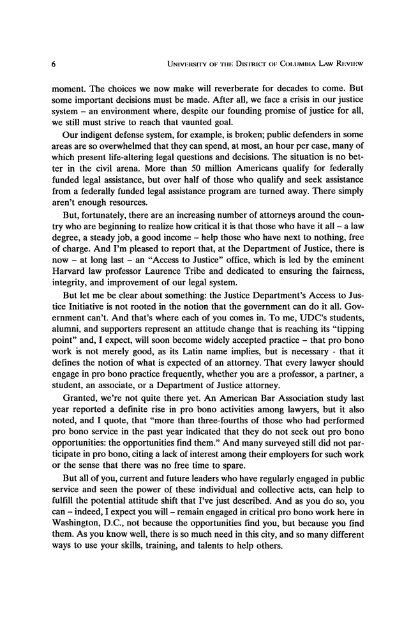Download Full Volume - UDC Law Review
Download Full Volume - UDC Law Review
Download Full Volume - UDC Law Review
- No tags were found...
Create successful ePaper yourself
Turn your PDF publications into a flip-book with our unique Google optimized e-Paper software.
6 UNIVERSITY OF TilE DISTIUcr OF COI.UMBlA LAW REVIEWmoment. The choices we now make will reverberate for decades to come. Butsome important decisions must be made. After all, we face a crisis in our justicesystem - an environment where, despite our founding promise of justice for all,we still must strive to reach that vaunted goal.Our indigent defense system, for example, is broken; public defenders in someareas are so overwhelmed that they can spend, at most, an hour per case, many ofwhich present life-altering legal questions and decisions. The situation is no betterin the civil arena. More than 50 million Americans qualify for federallyfunded legal assistance, but over half of those who qualify and seek assistancefrom a federally funded legal assistance program are turned away. There simplyaren't enough resources.But, fortunately, there are an increasing number of attorneys around the countrywho are beginning to realize how critical it is that those who have it all - a lawdegree, a steady job, a good income - help those who have next to nothing, freeof charge. And I'm pleased to report that, at the Department of Justice, there isnow - at long last - an "Access to Justice" office, which is led by the eminentHarvard law professor Laurence Tribe and dedicated to ensuring the fairness,integrity, and improvement of our legal system.But let me be clear about something: the Justice Department's Access to JusticeInitiative is not rooted in the notion that the government can do it all. Governmentcan't. And that's where each of you comes in. To me, <strong>UDC</strong>'s students,alumni, and supporters represent an attitude change that is reaching its "tippingpoint" and, I expect, will soon become widely accepted practice - that pro bonowork is not merely good, as its Latin name implies, but is necessary - that itdefines the notion of what is expected of an attorney. That every lawyer shouldengage in pro bono practice frequently, whether you are a professor, a partner, astudent, an associate, or a Department of Justice attorney.Granted, we're not quite there yet. An American Bar Association study lastyear reported a definite rise in pro bono activities among lawyers, but it alsonoted, and I quote, that "more than three-fourths of those who had performedpro bono service in the past year indicated that they do not seek out pro bonoopportunities: the opportunities find them." And many surveyed still did not participatein pro bono, citing a lack of interest among their employers for such workor the sense that there was no free time to spare.But all of you, current and future leaders who have regularly engaged in publicservice and seen the power of these individual and collective acts, can help tofulfill the potential attitude shift that I've just described. And as you do so, youcan - indeed, I expect you will - remain engaged in critical pro bono work here inWashington, D.C., not because the opportunities find you, but because you findthem. As you know well, there is so much need in this city, and so many differentways to use your skills, training, and talents to help others.














